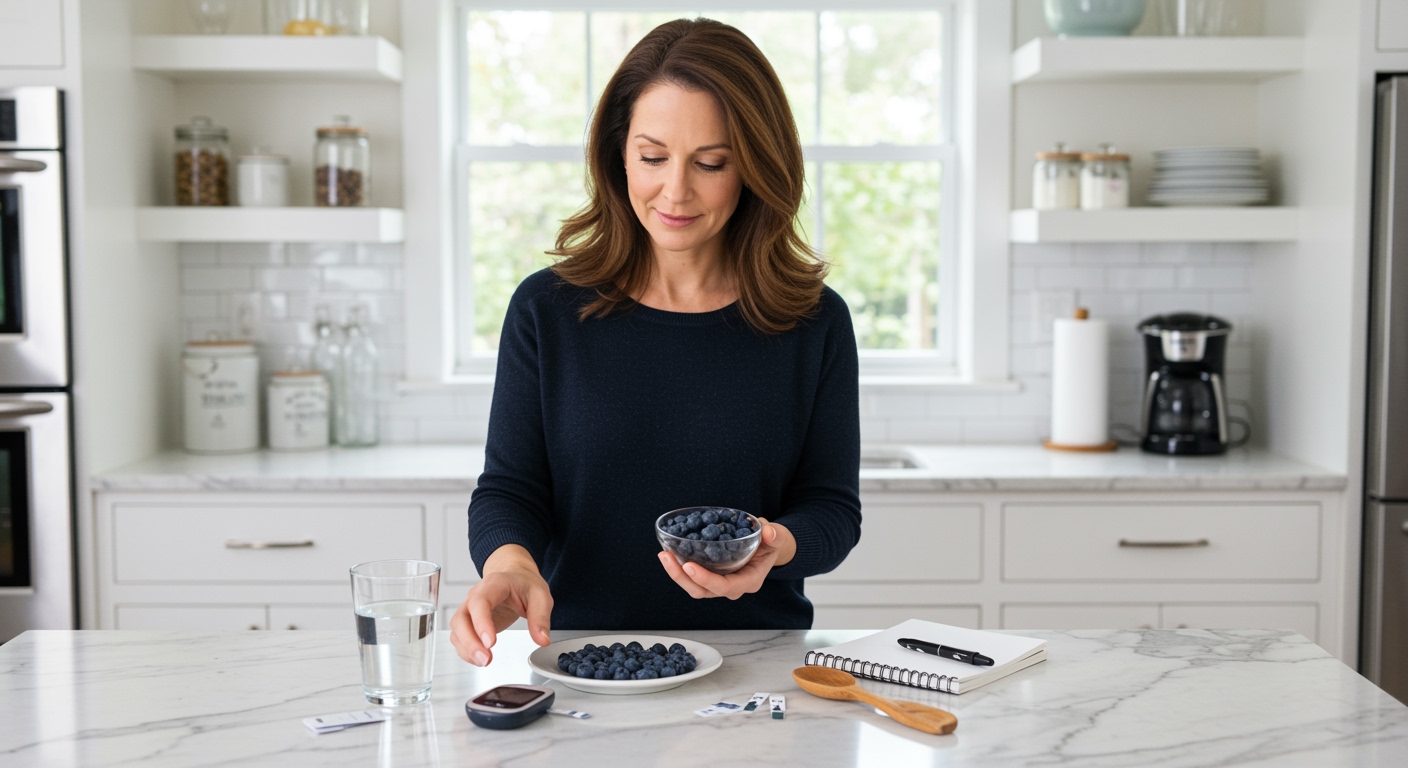✪ Key Takeaway: Blueberries are safe for diabetes when eaten in proper portions due to their low glycemic index and blood sugar benefits.
Introduction
Your doctor just told you that you have diabetes, and now every food choice feels like walking through a minefield.
You probably wonder if sweet fruits like blueberries will send your blood sugar through the roof and make your condition worse.
Hi, I’m Abdur, your nutrition coach, and today I’m going to explain exactly how blueberries affect your blood sugar and why they might actually help your diabetes management.
Do Blueberries Spike Blood Sugar?
Blueberries have a glycemic index of only 53, which puts them in the low category for blood sugar impact.
This means they cause a gradual rise in blood glucose rather than the sharp spikes you get from processed foods or high-sugar fruits.
The fiber content in blueberries slows down sugar absorption in your intestines, preventing rapid glucose surges.
One cup of fresh blueberries contains about 15 grams of natural sugars, but the fiber and water content help your body process this sugar more slowly.
Your pancreas responds to this gradual sugar release by producing insulin at a steady pace rather than dumping large amounts all at once.
Research shows that people with type 2 diabetes who ate blueberries experienced improved glucose control compared to those who avoided fruit entirely.
✪ Pro Tip: Eat blueberries with protein or healthy fats to slow sugar absorption even more.
How Do Blueberries Actually Help Diabetes?
Blueberries contain powerful anthocyanins that give them their deep blue color and provide remarkable benefits for diabetes management.
These compounds work at the cellular level to improve how your muscles and liver respond to insulin, making your body more efficient at using glucose.
The antioxidants in blueberries protect your blood vessels from the damage that high blood sugar can cause over time.
Studies demonstrate that regular blueberry consumption can reduce inflammation markers that contribute to insulin resistance.
Your body’s ability to transport glucose into cells improves when you consume blueberries regularly, leading to better overall blood sugar control.
The natural compounds in blueberries also help protect the beta cells in your pancreas that produce insulin, potentially slowing the progression of diabetes.
Research involving men with type 2 diabetes showed that eating blueberries for 8 weeks led to significant improvements in insulin sensitivity and glucose metabolism.
✪ Fact: Blueberries contain more antioxidants than most other commonly eaten fruits.
What Is The Right Portion Size?
The ideal serving size for blueberries when you have diabetes is half a cup to one cup of fresh berries.
This portion provides about 7-15 grams of carbohydrates, which fits well within most diabetes meal plans without causing blood sugar spikes.
Your individual carbohydrate tolerance will determine whether you should stick to the smaller or larger portion size.
Frozen blueberries without added sugar have the same nutritional value as fresh ones, making them a convenient year-round option.
Avoid dried blueberries or blueberry juice, as these concentrated forms contain much higher sugar levels and can cause rapid blood glucose increases.
The timing of when you eat blueberries matters just as much as the portion size for optimal blood sugar management.
✪ Note: Always test your blood sugar 2 hours after eating to see how your body responds.
When Should You Eat Blueberries?
The best time to eat blueberries is with meals rather than as standalone snacks to minimize blood sugar impact.
Eating blueberries with protein sources like Greek yogurt or nuts creates a more balanced blood sugar response.
Morning consumption works well because your body is naturally more insulin sensitive after fasting overnight.
Avoid eating blueberries late at night when your metabolism slows down and glucose clearance becomes less efficient.
Pre-exercise timing can be beneficial because physical activity helps your muscles absorb glucose more effectively.
If you take diabetes medications, coordinate your blueberry consumption with your medication schedule to avoid blood sugar fluctuations.
✪ Pro Tip: Add blueberries to oatmeal or yogurt for a diabetes-friendly breakfast combination.
Are There Any Risks To Consider?
Blueberries are generally safe for people with diabetes, but individual responses can vary based on your current blood sugar control.
Some people may experience higher blood sugar responses if they eat blueberries during periods of stress or illness when insulin resistance increases.
If you take blood-thinning medications, the vitamin K content in large amounts of blueberries could potentially interact with your medication.
Eating excessive amounts of any fruit, including blueberries, can contribute to weight gain, which negatively affects diabetes management.
People with gastroparesis, a diabetes complication that slows stomach emptying, should be cautious with high-fiber foods like blueberries.
Always monitor your blood glucose levels when introducing new foods to understand how your body specifically responds to blueberries.
✪ Note: Consult your healthcare provider before making significant dietary changes if you have complications.
The Bottom Line
Blueberries are not only safe for people with diabetes but can actually support better blood sugar management when eaten in appropriate portions.
The key to diabetes nutrition is not avoiding healthy foods but learning how to include them wisely in your daily routine.
I would love to hear about your experience with blueberries and diabetes management, so please share your thoughts, questions, or success stories in the comments below.
References
At NutritionCrown, we use quality and credible sources to ensure our content is accurate and trustworthy. Below are the sources referenced in creating this article:
- US Highbush Blueberry Council: New Research Explores Blueberries Positive Effects in Men with Type 2 Diabetes
- January AI: Blueberries Glycemic Index
- PMC: Blueberries and Cardiovascular Disease Prevention
- PMC: The Effects of Blueberry Consumption on Metabolic Health





